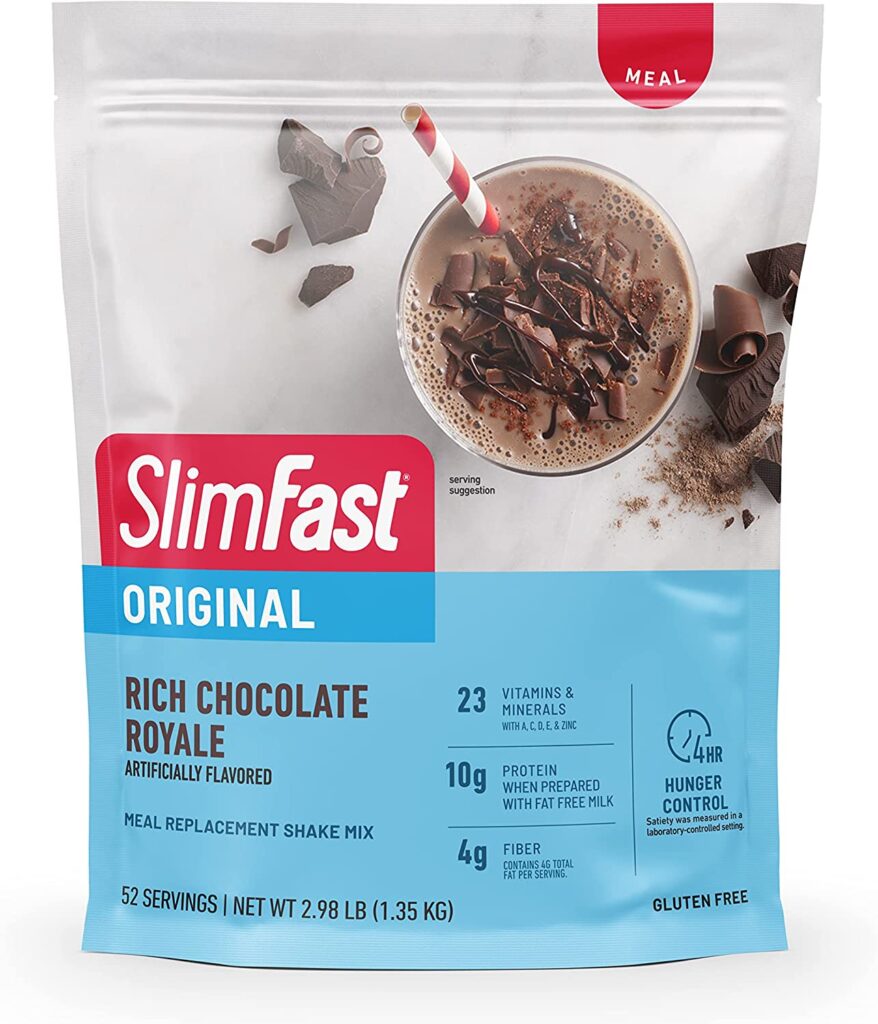A. Introduction:
In the pursuit of weight loss, many individuals seek quick and efficient solutions to shed unwanted pounds. One approach that often comes up in such discussions is the Very Low-Calorie Diet (VLCD). A VLCD involves consuming an extremely limited number of calories per day, typically below 800 calories. While this diet can lead to rapid weight loss, it is essential to understand its implications, potential benefits, and risks to make an informed decision about its suitability. In this article we will explore the merits and demerits of what is considered the fastest weight loss diet, the very low calorie diet
B. What is a Very Low-Calorie Diet (VLCD)?
A Very Low-Calorie Diet (VLCD) is a structured eating plan that restricts calorie intake to an extreme level, generally below 800 calories per day. This dietary approach typically replaces regular meals with low-calorie shakes, bars, soups, or pre-packaged meals to ensure a controlled and consistent calorie intake.
Remember, it’s always a good idea to consult with a healthcare professional or registered dietitian before making any significant changes to your diet or embarking on a weight loss journey. They can provide personalized guidance based on your specific needs and help you develop a plan that promotes both weight loss and overall well-being.
Benefits of VLCDs:
- Rapid Weight Loss
The primary benefit of a VLCD is its potential for rapid weight loss. Due to the severe calorie restriction, individuals often experience a significant reduction in weight within a short period. This can be motivating for those seeking immediate results.
2. Medical Supervision
VLCDs are usually conducted under medical supervision to monitor the individual’s health and ensure they are receiving adequate nutrition. Regular check-ups and consultations with healthcare professionals can help mitigate potential risks.
3. Health Improvements

In some cases, VLCDs may be recommended for individuals with obesity-related health conditions, such as type 2 diabetes or high blood pressure. Rapid weight loss through a VLCD can lead to improvements in these conditions, providing short-term relief and motivation for long-term behavior changes.
Risks and Considerations:
VLCDs often involve severe calorie restriction, which can lead to inadequate intake of essential nutrients like vitamins, minerals, and protein. This can result in nutrient deficiencies, compromising overall health and potentially leading to various complications. Other riks include:
- Muscle Loss
Rapid weight loss achieved through a VLCD can cause the loss of both fat and muscle mass. Muscle loss can negatively impact metabolism, making it harder to maintain weight loss and increasing the likelihood of weight regain once normal eating habits are resumed.
2. Psychological Impact
VLCDs can be mentally and emotionally challenging due to the strict nature of the diet. The severe calorie restriction and limited food choices may lead to feelings of deprivation, food preoccupation, or even disordered eating behaviors. It is crucial to consider the potential psychological impact before embarking on a VLCD.
3. Sustainability
VLCDs are not meant to be followed for an extended period. They are often designed as short-term interventions or for specific medical conditions. Sustaining such a low-calorie intake is challenging, and transitioning to a more balanced and sustainable eating pattern is necessary for long-term weight maintenance.

The Very Low-Calorie Diet (VLCD) is an extreme dietary approach that can lead to rapid weight loss. While it may offer short-term benefits and be appropriate for certain individuals under medical supervision, it is crucial to weigh the potential risks and considerations associated with such an approach. Nutrient deficiencies, muscle loss, psychological impact, and the need for long-term sustainability should all be taken into account.
Before embarking on a VLCD or any weight loss program, it is recommended to consult with healthcare professionals or registered dietitians. They can provide personalized guidance, consider individual circumstances, and help develop a balanced approach to weight loss that is both effective and sustainable in the long run. Remember, the key to successful and lasting weight management lies in adopting healthy lifestyle changes and making gradual progress towards your goals.
C. When is VLCD considered the best option?
The Very Low-Calorie Diet (VLCD) is generally considered appropriate in specific situations and circumstances where it can provide benefits under medical supervision. Here are a few scenarios where a VLCD might be considered as a potential option:
1. Severe Obesity
For individuals with severe obesity (typically a body mass index, or BMI, of 35 or higher) who have struggled to lose weight through other methods, a VLCD may be recommended as a short-term intervention. It can help jump-start weight loss and provide motivation for further lifestyle changes.
2. Medically Supervised Programs
VLCDs are typically administered within medically supervised programs where healthcare professionals closely monitor the individual’s health and provide guidance throughout the process. These programs ensure that potential risks are minimized, and the individual’s nutritional needs are met.

3. Preoperative Weight Loss
In some cases, individuals who are preparing for weight loss surgery may be advised to follow a VLCD to reduce liver size and overall body weight. This can help improve surgical outcomes and reduce the risk of complications during the procedure.
4. Obesity-Related Health Conditions
Individuals with certain obesity-related health conditions, such as type 2 diabetes or high blood pressure, may benefit from a VLCD under medical supervision. Rapid weight loss can lead to improvements in these conditions, providing short-term relief and motivation for long-term lifestyle changes.
5. Time-Sensitive Situations
In certain situations where there is an urgent need for weight loss, such as in preparation for a medical procedure or for individuals who require rapid weight loss for specific reasons, a VLCD may be considered. However, it is crucial to evaluate the risks and benefits on an individual basis and closely monitor the individual’s health throughout the process.
It’s important to note that even in these circumstances, a VLCD should only be followed for a limited duration and with proper medical supervision. Transitioning to a more balanced and sustainable eating plan after the VLCD phase is essential for long-term weight maintenance and overall health.
Always consult with healthcare professionals, such as doctors or registered dietitians, to determine if a VLCD is suitable for your specific situation and to receive appropriate guidance throughout the process.
D. Overview of VLCD’s success rate
When considering the success rate of the Very Low-Calorie Diet (VLCD) in specific circumstances, it’s important to note that individual outcomes can vary significantly based on factors such as adherence to the diet, overall health status, and the presence of any underlying medical conditions. Here’s an assessment of the success rate in different situations:
- Severe Obesity
VLCDs can be effective in achieving significant weight loss in individuals with severe obesity. Studies have shown that under medical supervision, VLCDs can lead to substantial short-term weight loss, often ranging from 3 to 5 pounds (1.4 to 2.3 kg) per week. However, it’s important to recognize that long-term success depends on transitioning to a more sustainable eating plan and adopting healthy lifestyle habits.
2. Medically Supervised Programs
VLCDs conducted within medically supervised programs tend to have higher success rates compared to unsupervised attempts. This is because healthcare professionals closely monitor individuals’ progress, provide support, and address any potential issues that may arise during the diet. The comprehensive approach of these programs enhances the chances of success.
3. Preoperative Weight Loss

VLCDs can be effective in achieving the desired weight loss before weight loss surgery. Success rates vary, but studies have shown that a VLCD can help individuals lose a significant amount of weight prior to surgery, thus improving surgical outcomes and reducing the risk of complications.
4. Obesity-Related Health Conditions
VLCDs can lead to improvements in obesity-related health conditions, such as type 2 diabetes and high blood pressure. The rapid weight loss achieved through a VLCD can help individuals better manage their condition and potentially reduce the need for certain medications. However, long-term success depends on maintaining a healthy weight and making sustainable lifestyle changes.
5. Time-Sensitive Situations
In situations where rapid weight loss is necessary within a specific timeframe, a VLCD can be effective. Success rates can be higher when the diet is strictly followed and medical supervision is in place. However, it’s important to note that weight regain is possible if healthy eating habits are not adopted after the VLCD phase.
Overall, while VLCDs can lead to rapid weight loss in specific circumstances, long-term success depends on transitioning to a balanced and sustainable eating plan, incorporating regular physical activity, and adopting healthy lifestyle habits. Working closely with healthcare professionals and registered dietitians can significantly improve the chances of achieving and maintaining weight loss success.
E. A final word of Caution
When it comes to weight loss, it’s important to prioritize methods that are healthy, sustainable, and promote long-term success. While there are various diets that claim to offer rapid weight loss, it’s crucial to approach them with caution and consider their potential risks.
One diet that is often associated with quick weight loss is a very low-calorie diet (VLCD). VLCDs typically involve consuming fewer than 800 calories per day and are usually followed under medical supervision. These diets often involve meal replacement shakes, bars, or soups to ensure you’re getting adequate nutrition while keeping your calorie intake extremely low. However, VLCDs are not meant for long-term use and should only be followed for a limited duration due to their potential risks and the possibility of nutrient deficiencies.
It’s worth noting that rapid weight loss can come with its own set of problems. When you lose weight too quickly, you’re more likely to lose muscle mass along with fat, which can negatively affect your metabolism. Additionally, rapid weight loss is often difficult to sustain, and people who lose weight too quickly are more likely to regain it later.
Rather than focusing on finding the fastest weight loss diet, it’s generally recommended to adopt a balanced and sustainable approach to weight loss. This involves creating a calorie deficit by consuming a healthy, well-rounded diet and engaging in regular physical activity. Gradual and steady weight loss at a rate of 1-2 pounds (0.5-1 kg) per week is considered a more realistic and sustainable goal for most individuals.




0 Comments